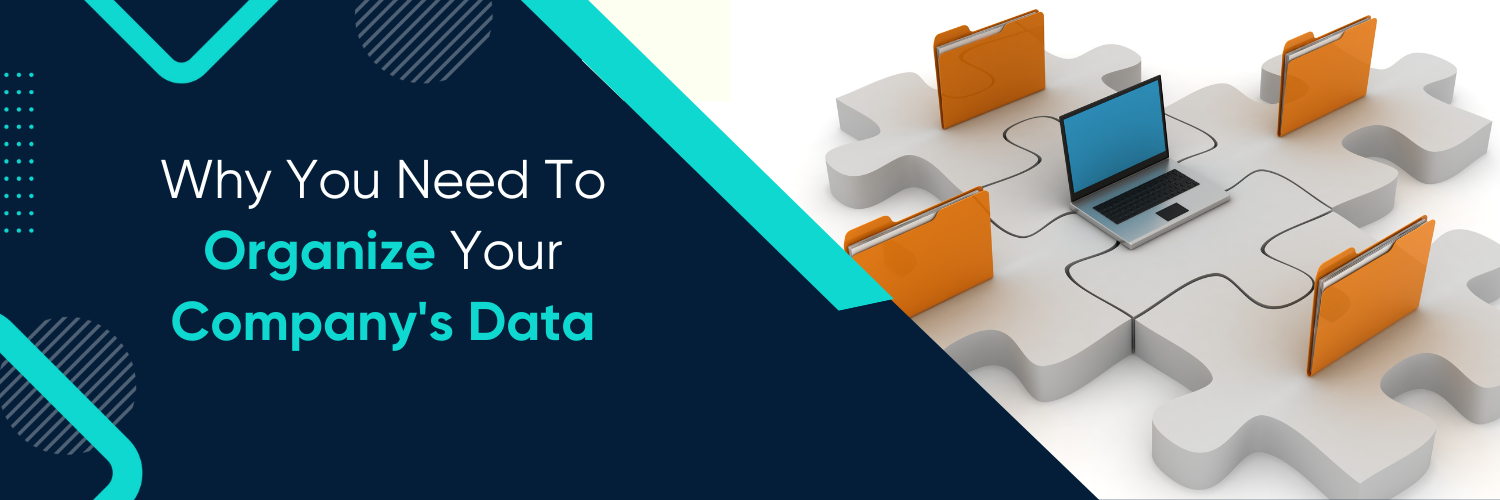From customer information to sales figures, employee records to market trends, companies are inundated with data from every angle. But what good is all that data if it’s not organised properly? In this blog post, we’ll explore the importance of organising your company’s data and why it’s essential for success in the digital age.
The Importance of Organising Data
Efficiency and Productivity
Imagine trying to find a specific file on your computer, but it’s buried deep within a disorganised folder structure. You waste precious time sifting through clutter instead of focusing on the task at hand. The same principle applies to company data. When data is organised, employees can quickly locate the information they need, increasing efficiency and productivity.
Decision-Making
Data-driven decision-making is crucial for business success. However, if your data is scattered across multiple systems or stored haphasardly, it becomes challenging to extract meaningful insights. Organised data allows decision-makers to analyse trends, identify opportunities, and make informed choices that drive growth and profitability.
Compliance and Security
Companies must adhere to strict data privacy and security standards in today’s regulatory landscape. Organising your data ensures compliance with regulations such as GDPR or CCPA by enabling proper data governance and access controls. Moreover, organised data is easier to secure, reducing the risk of data breaches and protecting sensitive information from unauthorised access.
How to Organise Your Company’s Data
Now that we understand why organising data is essential let’s discuss practical strategies for achieving this goal.
Establish a Data Management Plan
Start by developing a comprehensive data management plan outlining how your organisation will collect, store, and access data. Define roles and responsibilities, establish data quality standards, and implement data backup and recovery protocols.
Centralise Data Storage
Consolidate your company’s data into a centralised repository or data warehouse. This simplifies access and ensures everyone works with the most up-to-date information. Consider cloud-based solutions for scalability and accessibility across remote teams.
Implement Data Classification
Not all data is created equal. Implement a data classification scheme to categorise information based on its sensitivity and importance. This allows you to apply appropriate security measures and access controls, ensuring that confidential data remains protected.
Invest in Data Analytics Tools
Unlock the full potential of your data by investing in analytics tools and platforms. These tools can help you uncover hidden patterns, forecast future trends, and derive actionable insights that drive business growth. Whether it’s business intelligence dashboards or predictive analytics algorithms, leverage technology to make the most of your data.
Tools for Organising a Company’s Data
There are several tools available to help organise a company’s data effectively. The choice of tool depends on factors such as the company’s size, the type of data being managed, and specific organisational needs. Here are some popular options:
Customer Relationship Management (CRM) Systems
Customer Relationship Management (CRM) systems are essential tools for businesses to effectively manage their interactions with customers, track leads, and streamline sales processes. These systems, exemplified by popular platforms like Salesforce, HubSpot Operations Hub, or Zoho CRM, provide a centralised hub for storing and accessing customer data, allowing businesses to build and maintain relationships with their clients.
At its core, a CRM system functions as a database where businesses can record and organise information about their customers, including contact details, communication history, purchase history, preferences, and more. By consolidating this data in one place, businesses can gain valuable insights into their customers’ behaviour, preferences, and needs, enabling them to tailor their marketing strategies and sales efforts accordingly.
CRM systems also facilitate lead management, allowing businesses to track and prioritise potential sales opportunities through various stages of the sales pipeline. This includes capturing leads from various sources, assigning them to sales representatives, and tracking their progress through the sales process until they are converted into paying customers.
Moreover, CRM systems often come equipped with features for automating repetitive tasks, such as sending follow-up emails, scheduling appointments, or generating reports. This automation saves time and ensures consistency and efficiency in customer interactions.
Overall, CRM systems play a crucial role in helping businesses nurture customer relationships, drive sales growth, and improve overall customer satisfaction and retention rates.
Enterprise Resource Planning (ERP) Systems
Enterprise Resource Planning (ERP) systems are comprehensive software solutions designed to integrate and streamline various business processes across different organisational departments and functions. Leading ERP platforms such as SAP, Oracle, or Microsoft Dynamics provide a unified system that connects disparate business functions, including accounting, human resources, supply chain management, manufacturing, inventory management, and more.
The primary goal of an ERP system is to enhance operational efficiency and effectiveness by providing real-time visibility into key business processes and data. By consolidating information from multiple departments into a single database, ERP systems enable better coordination and collaboration among different parts of the organisation, leading to improved decision-making and resource allocation.
One of the key features of ERP systems is their ability to standardise and automate business processes, reducing manual effort and minimising errors. For example, ERP systems can automate routine tasks such as payroll processing, invoice generation, purchase order management, and inventory tracking, freeing up employees’ time to focus on more strategic activities.
Additionally, ERP systems provide robust reporting and analytics capabilities, allowing businesses to generate insights from their data and make informed decisions. With built-in reporting tools and customisable dashboards, users can monitor key performance indicators (KPIs), track trends, and identify areas for improvement across various aspects of their operations.
Overall, ERP systems are critical in helping organisations streamline their operations, improve productivity, and adapt to changing business needs in today’s competitive landscape.
Data Management Platforms (DMP)
Data Management Platforms (DMPs) are sophisticated tools marketers and advertisers use to collect, organise, and analyse large volumes of customer data for targeted marketing campaigns and personalised experiences. DMPs such as Adobe Audience Manager or Oracle Data Management Platform are centralised repositories for aggregating data from multiple sources, including websites, mobile apps, social media, and offline channels.
The primary function of a DMP is to create a unified view of the customer by combining data from various touchpoints and sources. This includes demographic information, browsing behaviour, purchase history, preferences, and interactions with marketing campaigns. By collating this data into comprehensive customer profiles, DMPs enable marketers to understand their target audience better and deliver more relevant and personalised messaging and offers.
One of the key capabilities of DMPs is audience segmentation, allowing marketers to divide their target audience into distinct groups based on specific criteria, such as demographics, interests, or behavioural patterns. These segments can then tailor marketing messages, optimise ad targeting, and improve campaign effectiveness.
Furthermore, DMPs provide advanced analytics and reporting tools that enable marketers to gain actionable insights from their data. Marketers can refine their strategies by analysing trends, identifying patterns, and measuring campaign performance, allocating resources more effectively, and maximising return on investment (ROI).
Overall, DMPs play a crucial role in helping marketers harness the power of data to drive more targeted and personalised marketing efforts, ultimately improving customer engagement and satisfaction.
Database Management Systems (DBMS)
Database Management Systems (DBMS) are software applications that provide a structured approach to storing, retrieving, and managing data in a database. Popular DBMS tools such as MySQL, PostgreSQL, or Microsoft SQL Server are widely used by organisations to efficiently handle large volumes of data and ensure data integrity and security.
At its core, a DBMS serves as a centralised repository for storing data in a structured format, typically organised into tables, rows, and columns. This structured approach allows for efficient data retrieval and manipulation through query languages such as SQL (Structured Query Language), enabling users to easily perform tasks such as adding, updating, deleting, and retrieving data.
One of the key advantages of DBMS is its ability to enforce data consistency and integrity through data validation, constraints, and transactions. This ensures that data remains accurate and reliable, even in multi-user environments where multiple users may access and modify data simultaneously.
Moreover, DBMS provides robust security features to protect sensitive data from unauthorised access, including user authentication, access control, and encryption. By implementing these security measures, organisations can mitigate the risk of data breaches and ensure compliance with data protection regulations.
Additionally, DBMS offers scalability and performance optimisation capabilities to accommodate growing data volumes and increasing user demands. DBMS can improve query performance and enhance overall system responsiveness through indexing, caching, and query optimisation features.
Overall, DBMS play a critical role in modern data management by providing a secure, reliable, and efficient way to store and access data, supporting a wide range of applications and business operations.
Data Warehousing Tools
Data Warehousing Tools are specialised software solutions designed to centralise and analyse large volumes of data from multiple sources for business intelligence and analytics purposes. Leading data warehousing platforms such as Snowflake, Amazon Redshift, or Google BigQuery provide scalable and cost-effective solutions for storing, managing, and processing data for reporting, analysis, and decision-making.
The primary function of a data warehousing tool is to consolidate data from disparate sources, including transactional databases, operational systems, external sources, and third-party applications, into a single, centralised repository known as a data warehouse. This centralised approach enables organisations to aggregate and standardise data from across the enterprise, making it easier to perform complex analytics and generate actionable insights.
One of the key advantages of data warehousing tools is their ability to support large-scale analytics and reporting initiatives. By providing a unified view of data from various sources, data warehousing tools enable users to perform advanced analytics, such as data mining, predictive modelling, and machine learning, to uncover hidden patterns, trends, and correlations within their data.
Moreover, data warehousing tools offer robust data management and governance capabilities to ensure data quality, consistency, and compliance. This includes data cleansing, transformation, and enrichment processes to standardise and harmonise data across different sources, as well as security controls and auditing mechanisms to protect sensitive information and ensure regulatory compliance.
Additionally, data warehousing tools provide scalability and performance optimisation features to handle growing data volumes and support increasing user demands. With data partitioning, parallel processing, and distributed computing, these tools can deliver high-performance analytics and reporting capabilities even as data volumes grow.
These are just a few examples of tools available for organising company data. Depending on the specific needs and goals of the organisation, it may be necessary to integrate multiple tools or invest in custom solutions tailored to the company’s requirements.
Let’s organize your data
The significance of organising your company’s data cannot be overstated. It is the cornerstone of efficiency, productivity, and informed decision-making in today’s data-driven world. Take the first step towards unlocking your business’s full potential by prioritising data organisation. For expert guidance and tailored solutions to optimise your data management processes, partner with Ubique Digital Solutions. Together, let’s propel your business to unprecedented success. Reach out to us today.
FAQs
Q: How Can Data Organisations Improve Customer Satisfaction?
By organising customer data effectively, businesses can provide personalized experiences, anticipate customer needs, and deliver timely support, ultimately leading to higher customer satisfaction and loyalty.
Q: What Are the Consequences of Neglecting Data Organisation?
Neglecting data from an organization can result in wasted time and resources, inaccurate reporting, compliance violations, security breaches, and missed opportunities for business growth.
Q: Is It Worth Investing in Data Management Software?
Investing in data management software can yield significant returns by streamlining operations, improving data quality, and empowering employees to extract valuable insights from data. It’s a worthwhile investment for any company leveraging data for competitive advantage.
Q: How Often Should Data Organization Processes Be Reviewed and Updated?
Data organisation processes should be reviewed and updated regularly to adapt to evolving business needs, regulatory requirements, and technological advancements. Aim for at least an annual review, but be prepared to adjust as needed.













